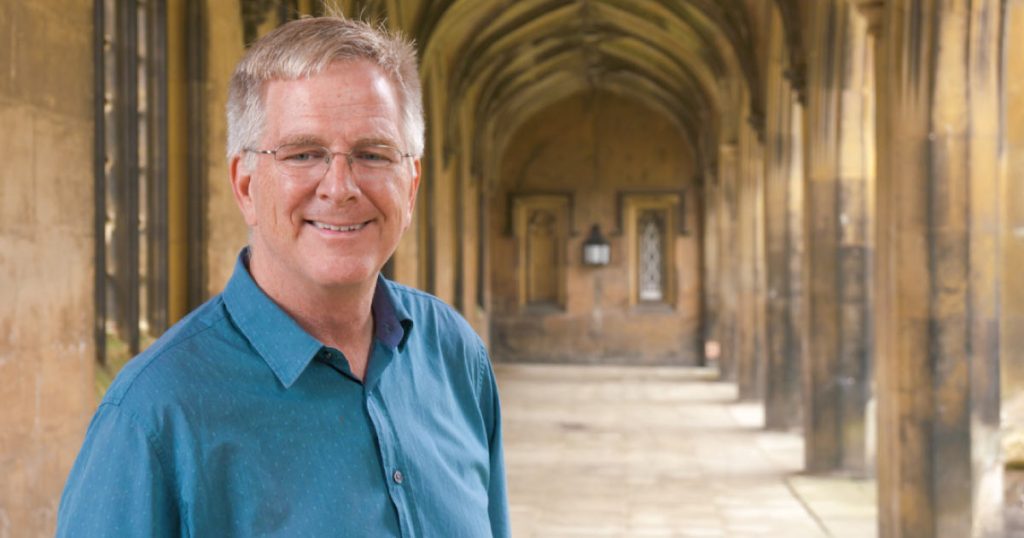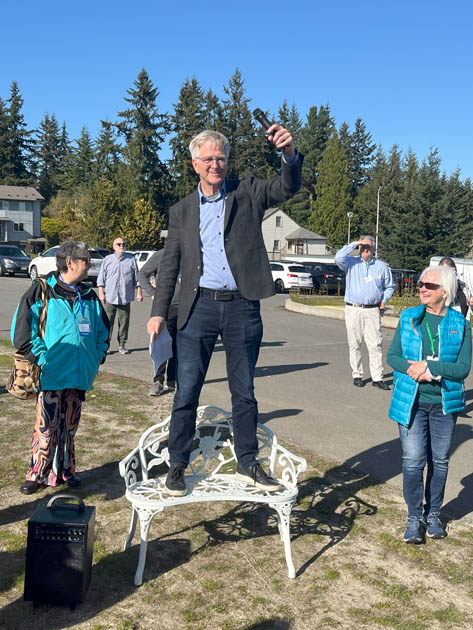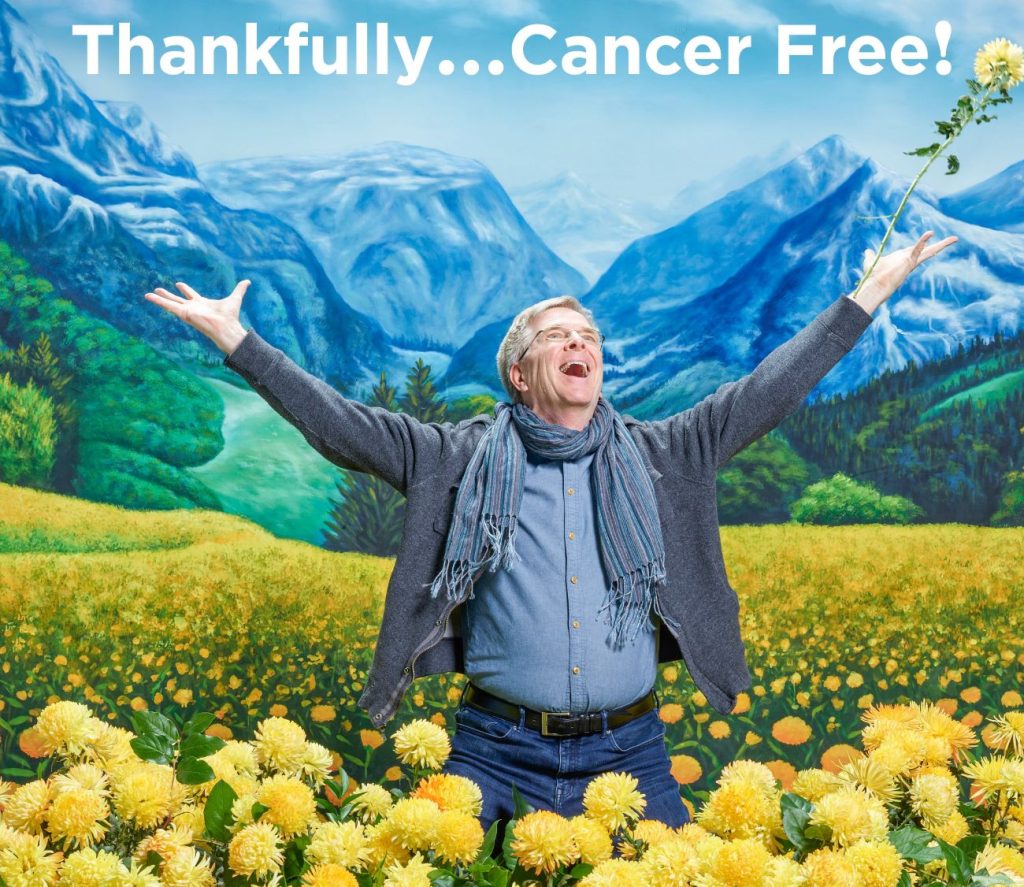EDMONDS—Six months after Edmonds celebrity Rick Steves shared his prostate cancer diagnosis on social media, he announced on Saturday, February 22, that he is “Cancer Free!”

The 69-year-old travel writer, TV host, and tourism personality, is known far beyond the Seattle area for his enthusiastic and informative travel programming, specifically the popular Rick Steves’ Europe show. His travel and tour business is headquartered in downtown Edmonds, and his website offers a variety of tour options for all sorts of tourists, from nervous newbies to red-eyed hippie backpackers (a camp that a young Steves fell into in the 1970s).
In his many years as a travel writer, TV host, and tourism personality, Rick Steves has spent countless hours at Hollywood galas, in cozy Swiss chalets, and backpacking Western Asia from Turkey to Pakistan. But it seems no matter where he goes, he will always call Snohomish County home.
Steves is also a big name in social advocacy. In 2017, he donated a $4 million dollar Lynnwood apartment complex to the YWCA, intended for sheltering “homeless women and kids.” Steves prominently supported cannabis legalization, giving a speech at the 2010 Seattle Hempfest, and also reportedly donates $1 million annually to environmental causes.
The Lynnwood Neighborhood Center received a jump start with a $3 million gift from Steves. The Lynnwood Neighborhood Center is a collaboration between Volunteers of America, Trinity Lutheran Church, Steves and the Greater South Snohomish County community at large.

Below is the statement Rick Steves posted to X announcing his successful prognosis and a new lease on life:
“PSA 55 to PSA 0.09 to PSA <0.03…Yes! If you know prostate cancer, you know the happy story of those numbers — and the relief of hearing my surgeon say, “You can now consider yourself cancer-free.”
“Life has been a whirlwind lately, with a new grandson, a New York Times bestselling book, and a president essentially declaring, “L’État, c’est moi” (“The state, it’s me”… in the spirit of Louis XIV.) But I’ve been on a deeply personal journey since last July, when I was diagnosed with prostate cancer. I promised I’d keep my traveling family posted — and I’m happy to now report that I’ve weathered the storm.
“As a traveler, I’ve embraced my season of cancer as a journey: Setting off into a mysterious world not of my choosing with no prior experience or language skills. Engulfed in a furious storm, relying on the good ship SS Medical Industry and the steady guidance of Captain Lin (my surgeon), my sails were filled by the prayers and loving wishes of friends, family, and the caring public. (It’s amazing how prayers and good thoughts can become tangible when we need them to power us through the waves.)
“For now, I’ve broken through the storm, and it’s smooth sailing ahead. But more storms are inevitable, and I’d be wise to keep in touch with the captain and take care of the ship. (This would be a nice place to segue into the value of continued government investment in medical and scientific research — but I’m trying my best to keep politics out of this post.)
“I decided from the start to share my cancer story with my Facebook friends as a public service. But I never dreamed it would be so newsworthy… from CNN to People Magazine to The New York Times. People care. And when you go public, people come out of the woodwork to share their own experiences with cancer and to help and support you.
“The message is important: I learned the hard way (almost the very hard way) about the importance of men being tuned into their bodies — especially older men like me, with a history of cancer in the family. I didn’t notice any symptoms and assumed my frequent trips to the WC were simply a consequence of my healthy determination to “stay hydrated.” Only after my diagnosis did I learn that my uncle and his dad both had prostate cancer at my age. It was totally on me… and I was too busy simply living to get tested.
“Thankfully, I got a new primary care doctor who wanted to kick off our relationship with a blood test. And two days later, our shared mission shifted radically from wellness to survival. After carefully considering all the options, I decided to get a radical prostatectomy — which meant my entire prostate would be removed.
“Going into the surgery, the big concern was: Had it metastasized? If the cancer is contained in your prostate and they take your prostate out… you’re good to go. But if it turns out that it spread… your journey could be a very long one (or a very sad, short one). It’s all about the “margin” between the cancer and the edge of your prostate, which can only be measured once it’s out. I envisioned my prostate as a good-looking little apple with a dark and rotten core (a good margin) or a windblown old dandelion with missing tufts (no margin plus spread). My doctor’s report after the surgery: “Not as good a margin as we had hoped… we can be guardedly optimistic… but we’ll need to wait for your PSA score in later blood tests.”
“A PSA score is a number that measures how much “Prostate-Specific Antigen” is in your blood. A high score can indicate your body is battling invasive cancer cells — and my initial PSA of 55 was through the roof. Two months after my surgery, it was good news… down to 0.09. But as my doctor says, “A big flame or a tiny flame — either can start a destructive fire.” He’s greedy and wanted it all gone, so he would only say he liked the trajectory and “we’ll see how it looks down the road.” And finally, my latest blood test has brought home some very good news: A score of <0.03, which means less than the smallest number they can measure.
“As I approach my 70th birthday, I’m energized by my clean bill of health and busier than ever. (I’m writing this six days into an eight-cities-in-ten-days tour promoting my newest book — which is actually my oldest: A journal I wrote on the Hippie Trail from Istanbul to Kathmandu when I was 23 years old.) And my doctor is giving me an A+ for being proactive: colonoscopy (check!), a visit to the dermatologist for skin cancer tests (check!), physical therapy for post-surgery wellness (check!), massaging away scars from the robotic surgery, which left big dimples on my belly (check!), Kegels (check!), stretching regularly (check!), and lots of walking (check!). (I’m training for a week of hiking in Italy’s Dolomites this summer.)
“Post-surgery, I found fellowship in a subreddit for men dealing with prostate cancer, which one Redditor described as “the cancer of little indignities.” And that includes lots of pee problems.
“‘Incontinence’ is a word known by women of a certain age… and by men who’ve had prostate surgery. When everything’s working as it should, underappreciated little muscles (sphincters) keep urine from leaking out of your bladder until it’s time to take a pee. After having your prostate removed, you leak because you can no longer use your internal sphincter, and you need to bring out and train the reserves — an external sphincter, which is the only one women (who have no prostate) can ever access. And that takes a month or two (or maybe six…) of Kegel boot camp.
“It’s a scary thing for anyone to leak. (You can read about a horrible disease called “fistula” that plagues poor women in Africa.) For many women in our society, leaking is an uncomfortable fact of life, especially after giving birth. And after men have prostate surgery, they gain an appreciation for what women go through. What do you do? Depends!
“Yes, men learn about pads (women smile knowingly). The incontinence stage seems to go on for an eternity. It’s made worse by knowing that 5 to 10 percent of men have long-term incontinence after prostate surgery, and many even need follow-up surgery to implant tools to help out. A key for anyone in this situation is patience. I was determined, but I almost felt hopeless. Dribble, dribble, deluge, dribble, dribble, pads, pads, pads. Then, after six weeks (and lots of Kegel exercises — which is like flexing the biceps between your legs), it was no more pads for me! (While I’m doing great, I now have much more empathy for the older people who, for decades on my bus tours, asked with terror in their eyes, “How long until the next potty stop?”)
“This may be TMI, but as I head into this stage, my understanding is that, after all that dribbling, your bladder gets too used to the feeling of frequently emptying itself, wimps out, and basically forgets how to hold a full load. This needs to be addressed by a gradual expansion of the liquid you retain before emptying. I’m enjoying the game of measuring each trip to the toilet (working from 100 ml to 250 ml and sometimes triumphing with 300 or, my personal record, nearly 350 ml). Still, whenever I cough, bend in a strange way, or LOL… I have an inkling for a tinkling.
“And what about the sexual dysfunction you always hear follows prostate removal? It varies from no problem to no more erections forever and ever, depending on how much unavoidable nerve damage your surgeon did while taking out everything that could have been cancerous. (How’s my ED situation? Let’s just say I’ll be no fun at an orgy for six to 12 months.)
“Going forward, I’ll get my PSA tested twice a year and then annually. Statistics and my surgeon tell me I should be just fine. There’s a lot that can be improved on in America’s healthcare industry — but as a citizen, I see the glass of our government as not half empty but as half full. (I believe efficient, affordable, and accessible medical care is a civil liberty — and in a country as rich as ours, it should be equally available to all.) I am so thankful for the care I was blessed to receive from Seattle’s Fred Hutchinson Cancer Research Center, the army of smart and dedicated people at UW Medicine, and my surgeon, Dr. Daniel Lin. And I have lots more to be thankful for… including the support of friends and loved ones (including you!) and a strong faith that I’m in good hands.
“I’m looking forward to many more years of happy travels, exciting collaborations, and beautiful friendships. Thank you for your love and support as I weathered this storm. I’m so happy that, together, we get to keep on travelin’!”

Author: Kayvon Bumpus













9 Responses
Dear Rick. Your account of your recovery is wonderful! I was going to write you anyway to tell you that although I had watched your programs often, now in an assisted living facility I enjoy it 5 evenings a week. It brings me a burst of joy and sometimes memories of places I have lived and traveled, like Africa (Mauretania and Ghana), Asia (mostly Indonesia), and Europe. Your shows enlighten and enhance my gratitude for the privilege I have had to meet so many delightful people and their cultures. Television is more of a blessing now than ever. I wish you many more years of your remarkably warm and generous sharing of your travel adventures.
Hello Rick (4 million air-miler here before retirement), 80 now. My GP felt something suspicious during the annual anal wave in my 60s. Short story, biopsy revealed ‘aggressive’. I elected robotic surgery since there were no surgery options with radiation is radiation failed. The first words my surgeon said to me upon becoming conscious, ‘We got the tumor out (with my prostate) before it exploded.’ The tumor was far more ‘aggressive’ than the biopsy showed. Cancer free now for +decade. Warning (I’m sure your medical team is aware and told you but, for the others who are entering this frightening period), testosterone is NOT our friend if faced with prostate issues or cancer. I was getting T injections every two weeks for years. On my many business trips I was given a gel to use but screwed up and used the gel along with the injections. PSA ‘jumped’ from 0.03 to 0.57. Dr took me off the injections for 3 maybe 4 weeks, PSA returned to 0.03 or 0.04. Been back to negligible the past 8-10 years now. Stay healthy Rick, men… start with a PSA base in your 50s. It is only a little check in the PSA box when you have a blood panel as part of your annual physical.
Rick, you and I are approximately the same age. All we have heard our entire lives is, “Give to cancer research.” And what have we gotten? More cancer, higher costs for treatment, and no end in sight. So, give your back handed slap to Trump all you want, our medical system went from bad to terrible when the big O rammed ACA through Congress. It is neither affordable nor does it provide care. First hand knowledge.
Dear Mr. Steves,
I’m sure you’re very glad you caught this early enough even though losing your prostate doesn’t come without other negatives. I recently had my prostate reduced by the new TURP Auqablation process. Even though I don’t have any cancer there are still risks. I sympathize with you and wish you the very best results.
My wife and I have visited Europe a number of times and visited a number of the locations you preview on your travel videos, Halstad being one of our favorites. My wife is from the Czech Republic, so we also enjoy the history and architectural beauty of so many of their cities.
God Bless you Rick.
So happy to hear you are moving in a positive directions. Please keep traveling. You bring us such joy. We travel because you showed us how.
Hi Rick. I had Prostate Cancer 6 years ago. I had Beam Radation. I am Cancer free. I am 77 years old. And doing great. I am glad you are doing great also.
Our whole family adores you. One of my personal views is of your family sliding down the mountain in the snow with candles for Christmas. We have traveled, but now that my husband is 87 and I’m 85 we have slowed down some. I Just love watching all of your travel shows. I have had breast cancer and then twenty years later ovarian cancer. But, your enthusiasm, marvelous character, and wonderful delivery of all that you see and do with your absolutely great voice just makes me sing. Love you Rick YOU WILL BE JUST FINE, I KNOW IT
Rick, you are truly an inspiration. I am so happy that you are cancer-free. It is the hardest journey we take. I love your show , you’re so knowledgeable about the places you travel to. Wish i had the money to go too, but at least i get to see the fantastic places,people, and Food, thru you. Be well.
Hugs.
I too have had prostate challenges, but from benign prostate hypertrophy, not cancer. One still needs a top notch urologist, multipoint biopsies and excellent imaging facility. Cataracts, hearing aids, root canals done early to avoid implants and a top notch cardiovascular group to guide you through the morass of lipid build up in vessels, diets, and medications. Don’t underestimate the value of PRP (platelet rich plasma) for muscular-tendon injuries even if Medicare refuses to pay for it. Life is an evolving platform of behaviors, diets, high quality medical care and ignoring the absurdity of Robert Kennedy, Jr. and the self-serving Donald Trump. And keep on doing and traveling as Rick advocates.